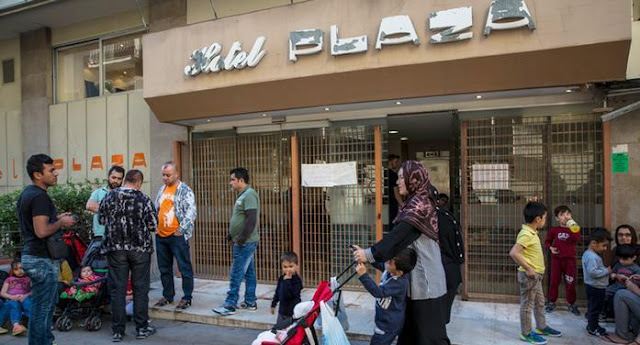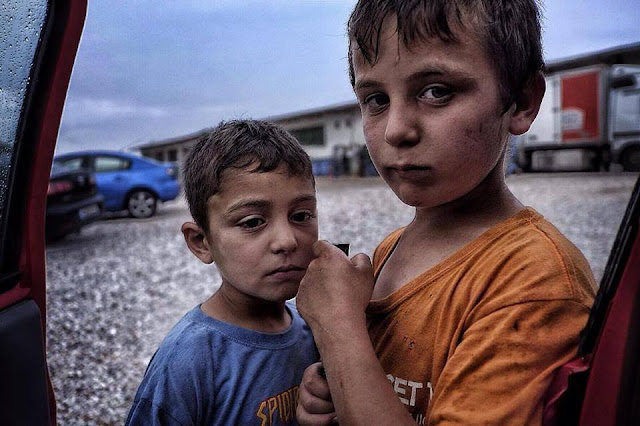 |
African migrants crossing the Mediterranean
|
I watched a news video made by MSF (Doctors without Borders) this afternoon. It showed a large inflatable boat being intercepted by the MSF rescue ship and the passengers being transferred and taken ashore. Every one of the passengers was a young African man, probably in his twenties. They didn’t look travel-weary, or stressed out by the destruction of their home towns, villages and city districts; these migrants looked like nervous young men courageously seeking their fortune and a better life. I can empathise with rural Europeans who might find these arrivals intimidating.
Perhaps they were coming from the trouble-spots of Southern Sudan, Eritrea or Nigeria. They had certainly experienced a frightening journey, - but they were a complete contrast to the Syrian families in Athens.
 |
| Refugees in Victoria Square on a wintry March morning |
All around Athens, you meet displaced people from Syria, Afghanistan, and Iraq.
There are well-dressed children, young teenagers, babes in arms, pregnant mothers and anxious fathers. Parents with pushchairs, children on tricycles.
 |
| Smartly-dressed young mums at Piraeus |
They are all confused and bewildered by the complexities of seeking asylum in Europe. Many are professionals; all just want to get started on building a new life, - especially for the sake of their children’s education and future.
Most would return to their beloved homeland if they could, but their homes, towns, villages and cities have been destroyed: flattened: reduced to rubble.
It is one thing to absorb whole family units into European society; it is a very different matter to integrate hundreds of single young men from rural Africa.
 Industrialised countries faced a similar scenario a hundred years ago, when young men (and women) came from the country into the cities to seek their fortunes, believing - in the words always attributed to Dick Whittington - that the streets of London were paved with gold. They had diplomas and certified qualifications, and the cities needed their skills
Industrialised countries faced a similar scenario a hundred years ago, when young men (and women) came from the country into the cities to seek their fortunes, believing - in the words always attributed to Dick Whittington - that the streets of London were paved with gold. They had diplomas and certified qualifications, and the cities needed their skills
This was when the YMCA and YWCA flourished, offering safe accommodation and respectable social activities to young men and women who left home for the first time to migrate to the cities and advance their career all over Britain. This was how my own father was able to be an economic migrant from Hull to London, furthering his career in advertising and initially lodging at the YMCA on Tottenham Court Road.
But what skill-set do these young men from Africa bring to the British economy? More importantly, how many of them have long-term plans to become British citizens, as compared to how many are making money for family back home, to whom they plan to return after a few years? Not that there's anything wrong with doing that in order to accumulate a nest egg: - there are hundreds of British expats doing precisely that in the Gulf and in Asia-Pacific.
My culture teaches me to reach out and help the dispossessed, the poor, the homeless, the refugees and, if I should so choose, it teaches me that I can seek to better my life by migrating across the country, or across the world. My children have had those options and made those choices.
My culture also teaches that this option should be available to anyone in any part of the globe, a right that is enshrined in the United Nations Charter.
 |
| The people who made the decision, won't have to live with it! |
The EU referendum has little to do with my last remaining years on this planet and everything to do with the world of our children and grandchildren, nephews, and nieces.
Their options have been decimated by the selfishness, short-sightedness and ignorance of their parents, grandparents, uncles and aunts who have now blocked the young generation’s European opportunities with their “LEAVE” votes in the referendum.
 |
| The verdict at Glastonbury. |
We don’t own the world we live in; we are its custodians, and in time will hand it on to the next generation.
Some of us have failed future generations by voting LEAVE; some of us are bitterly disappointed by a result that betrays our grandchildren.
We now have to make it all work, and maximise the value of their inheritance.
But it's not about money, jobs, and opportunities, it's about the ethics that we teach and the ethics that we demonstrate in the way we treat the planet and all its inhabitants.
But it's not about money, jobs, and opportunities, it's about the ethics that we teach and the ethics that we demonstrate in the way we treat the planet and all its inhabitants.


















